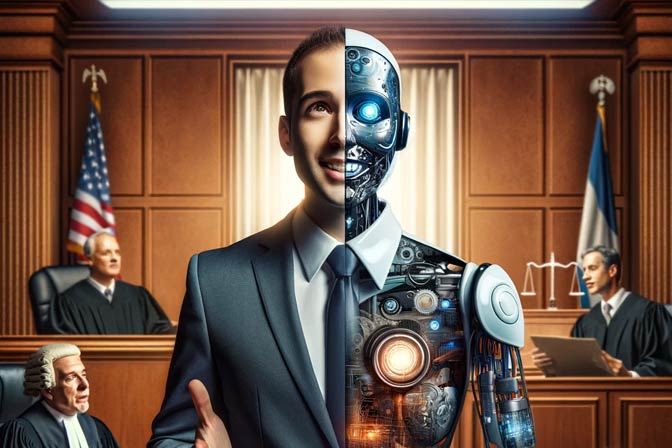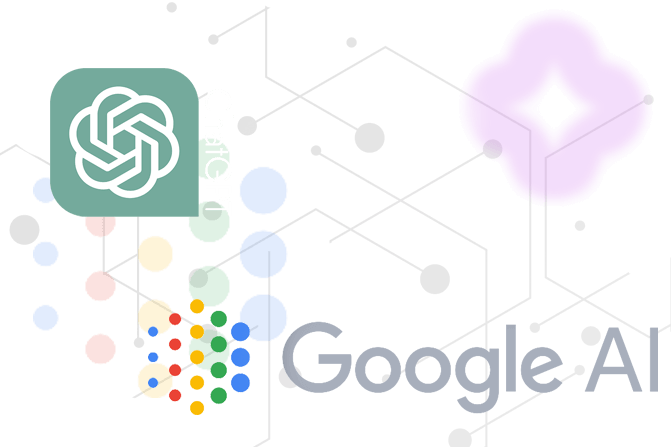

LAWYER MARKETING ARTICLES
Is AI Smarter than a Lawyer?

When it comes to the law, not many people would substitute the expertise of attorneys in favor of artificial intelligence (AI). A single mistake can be incredibly costly for clients, whether that mistake is realized in the form of inadequately drafted contracts or a failure to grasp the intricacies of a dispute. Here, the cost of a mistake can far outweigh the expense of hiring a competent lawyer. This has dissuaded many a person from opting to use AI for legal advice or as a tool for do-it-yourself contracts. However, AI is no longer a fledgling innovation and can perform complex tasks successfully at a rate that cannot be achieved by humans. Lawyers are not exempt from the implications of rapidly developing AI capabilities.
What is Intelligence?
Intelligence is a notoriously difficult concept to define. There are far too many facets to the word – characteristics to account for – to accurately identify a single definition that fairly encompasses all forms of intelligence. You could say that intelligence is the capacity to obtain and utilize knowledge and expertise. Or you could say that intelligence is the practical ability to not only acquire and understand information and knowledge, but to apply that knowledge effectively in various contexts. But these definitions do not account for interpersonal intelligence or intrapersonal intelligence, both of which are vital to the legal industry.
AI and attorneys have various forms of intelligence in common, such as:
- Legal Knowledge: Lawyers possess extensive knowledge of laws, regulations, legal principles, and precedents relevant to their practice areas. AI, through extensive data collection and source training, has an immense data pool on the law as a whole. While AI will be continually updated on every law imaginable, it is impossible for any one attorney to amass an equal knowledge of the law.
- Analytical Skills: Lawyers are trained to analyze complex legal issues, identify relevant facts, assess risks, and devise effective strategies. They must have sharp analytical abilities to dissect legal documents, statutes, and case law. AI, on the other hand, is trained to analyze and synthesize exorbitant amounts of information to accurately examine legal texts at a rate much faster than attorneys, and far less prone to mistakes.
- Problem-Solving Abilities: Lawyers excel in problem solving, as they are often tasked with resolving disputes, negotiating settlements, and finding solutions to complex legal challenges. They must think critically and creatively to address the needs of their clients. While AI is poised to identify mistakes and hurdles in information, it is unable to do so creatively. Its solutions are logical and defined by the information at its disposal.

The above may be frightening to attorneys who pride themselves on their ability to grapple with legal knowledge to serve their clients, but there are many other forms of intelligence that AI does not currently possess:
- Ethical Judgment: Lawyers are expected to adhere to high ethical standards in their practice. They must exercise good judgment and integrity in their interactions with clients, colleagues, and the legal system.
- Emotional Intelligence: Successful lawyers possess emotional intelligence, enabling them to understand and navigate the emotions of clients, witnesses, and opposing parties. This skill is crucial in negotiations, mediation, and courtroom advocacy.
- Communication Skills: Effective communication is essential for lawyers. They must articulate legal arguments persuasively, draft clear and concise legal documents, and communicate effectively with clients, judges, juries, and opposing counsel.
- Advocacy and Persuasion: Lawyers are skilled advocates who can articulate their clients’ positions persuasively in legal proceedings. They possess the ability to craft compelling arguments, present evidence effectively, and advocate for their clients’ interests in negotiations, mediation, arbitration, and litigation.
- Risk Management: Lawyers excel in strategic planning and risk management, identifying potential legal risks and devising proactive strategies to mitigate them. They can assess the strengths and weaknesses of a case, anticipate counterarguments, and adapt their approach based on evolving circumstances.
- Negotiation and Conflict Resolution: Lawyers possess strong negotiation skills, enabling them to reach favorable settlements and resolutions for their clients. They can negotiate effectively with opposing parties, mediate disputes, and find creative solutions to complex legal issues.
Both attorneys and AI possess certain forms of intelligence that make them apt for specific functions in the legal industry, but it is lawyers who exhibit the vital combination of hard skills, ethical judgment, emotional intelligence, and the ability to negotiate. AI lacks the nuanced judgment, empathy, creativity, and strategic thinking inherent in human lawyers. It cannot fully replicate the ethical decision making, emotional intelligence, persuasive advocacy, or adaptability required in legal practice.
Will AI Replace Lawyers?
Whether or not AI could ever, or will, replace lawyers is a well-documented debate. While there are firm defendants on both sides of the discussion, the underlying truth is that, yes, AI will replace attorneys – but only in some areas.
An attorney’s job is not only defined by trials, negotiations, and mediation. Mountains of paperwork, filings, and myriad administrative duties fill a significant portion of any attorney’s day. These tasks are most susceptible to being replaced by AI, simply because they entail arduous amounts of data sifting and analysis (functions that AI excels in). Legal documents, specifically well-crafted legal documents, exclude ambiguity and rely on factual information. AI is able to analyze and synthesize these documents at an exceptionally rapid rate and to great effect. This is especially true as AI relies on an absence of ambiguity to actually grasp concepts. This positions AI well to co-opt roles like document and contract review, discovery, due diligence, and contract management. However, these aspects of an attorney’s job are often performed by paralegals and junior lawyers. As a result, the incorporation of AI into legal practices may impact lower-level lawyers and paralegals; however, it is more likely that their roles will transform to encompass AI review and supervision.
An important aspect of this topic is defining what attorneys do. The paperwork lawyers invest their time in – the hardcopy illustration of law – does not an attorney make. In actuality, people hire attorneys for their skill in assessing risk and overcoming complex legal circumstances through experience, emotional intelligence, and individual performance. AI cannot replicate experience (both in terms of the law and life experience) and, further, cannot grapple with the nuances and context of individual cases. A vast amount of emotion is involved in most legal cases, and it is up to an attorney to empathize with their clients, build relationships, and utilize the emotional aspect of cases to impact outcomes. AI cannot do this now and may never be able to.
In short, while AI may replace attorneys in performing data analysis and case review, it will not replace attorneys in the practice of their profession.
Is AI a Tool or a Threat to Lawyers?
Given that attorneys perform a significantly practical function, as opposed to a purely informational one, it is highly unlikely that AI will pose an exceedingly large threat to lawyers. It is much more likely that the legal profession will incorporate AI tools to form a hybrid approach to their work. By using AI to complete arduous routine tasks, attorneys may speed up their work and devote their time to other, potentially more important, areas of their role. Additionally, AI as a tool can help attorneys facilitate more complicated and time-consuming cases.
Ways in which AI can serve as a tool for lawyers include the following:
- Legal Research: AI-powered platforms can swiftly search through vast legal databases, case law, statutes, and regulations to provide attorneys with relevant information and precedents, saving time and effort.
- Document Review and Analysis: AI algorithms can analyze and review legal documents, contracts, and briefs for errors, inconsistencies, or relevant clauses. This capability streamlines the review process and helps lawyers identify critical information efficiently.
- Due Diligence: In mergers and acquisitions, AI can assist with due diligence processes by quickly reviewing and extracting relevant information from extensive documentation, identifying potential risks, and ensuring compliance with regulations.
- Contract Management: AI-powered contract management systems can automate the creation, review, and management of contracts, flagging important clauses, deadlines, and obligations to ensure compliance and minimize risks.
- Legal Writing Assistance: AI tools can aid attorneys in drafting legal documents, pleadings, and briefs by providing suggestions, corrections, and alternative phrasing based on past legal documents and language patterns.
- E-Discovery: AI algorithms can efficiently sift through electronic data and documents to identify relevant information for litigation or investigations, reducing the time and cost associated with traditional manual review processes.
- Case Management: AI-powered case management software can organize case-related information, deadlines, and tasks, facilitating collaboration among legal teams and ensuring efficient case progress.
While AI can complement lawyers by automating routine tasks, streamlining processes, and enhancing efficiency, it cannot replace the multifaceted skills and informed knowledge that lawyers have accrued through both their training and their experience. The legal profession demands a blend of technical knowledge, analytical acumen, interpersonal skills, and ethical judgment, which remains the domain of human attorneys. The symbiotic relationship between AI and human lawyers is likely to yield the most effective outcomes for clients.
The Future of AI in the Legal Profession
Intelligence encompasses various facets beyond cognitive abilities. While AI can assist lawyers in some areas, it cannot replace the comprehensive skill set that attorneys possess. AI may truly surpass lawyers in certain specific tasks (such as the routine tasks often performed by paralegals), but it is not inherently “smarter” than lawyers in the broader sense of the term. However, the future of the legal profession depends largely on how effectively legal professionals leverage AI to enhance their profession. By embracing AI as a complement to their already extensive legal repertoire rather than a replacement, lawyers can utilize its potential to further serve clients and expand the scope of their abilities.


